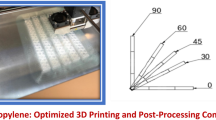Abstract
The purpose of the present study is to investigate process capability of polyjet printing (PP) for plastic components. Starting from the identification of component, prototypes with three different type of plastic material were prepared at different orientations. Measurements on the coordinate measuring machine helped in calculating the dimensional tolerances of the plastic components produced. Some important mechanical properties were also compared to verify the suitability of the components. Final components produced are acceptable as per ISO standard UNI EN 20286-I (1995) and DIN16901. The results of study suggest that PP process lies in ±4.5sigma (σ) limit as regard to dimensional accuracy of plastic component is concerned. This process ensures rapid production of pre-series technological prototypes and proof of concept at less production cost and time.
Similar content being viewed by others
References
I. Ainsworth, M. Ristic and D. Brujic, CAD-based measurement path planning for free form shapes using contact probes, International Journal of Advanced Manufacturing Technology, 16 (2000) 23–31.
J. P. Singh and R. Singh, Comparison of rapid casting solutions for lead and brass alloys using three dimensional printing, Journal of Mechanical Engineering Sciences (Proc. of IMechE Part C), 223(C9) (2009) 2117–2123.
R. Singh and M. Verma, Investigations for reducing wall thickness of aluminium shell casting using three dimensional printing, Journal of Achievements in Materials and Manufacturing Engineering, 31(2) (2008) 565–569.
R. Singh, Three dimensional printing for casting applications: A state of art review and future perspectives, Advanced Materials Research, 83–86 (2010) 342–349.
V. Singh, Experimental investigations for statistically controlled rapid moulding solution of plastics using Polyjet rapid prototyping, M.Tech. Thesis, Punjab Technical University, Jalandhar (2010).
UNI EN 20286-1 ISO system of limits and fits. Bases of tolerances, deviations and fits (1995).
R. Singh, V. Singh and M.S. Saini, Experimental investigations for statistically controlled rapid moulding solution of plastics using polyjet printing, Proceedings of the ASME 2010 International Mechanical Engineering Congress & Exposition (IMECE2010), November 12–18, 2010, Vancouver, British Columbia, Canada.
J. P. Singh and R. Singh, Investigations for statistically controlled rapid casting solution of lead alloys using three dimensional printing, Journal of Mechanical Engineering Sciences (Proc. of IMechE Part C), 223(C9) (2009) 2125–2134.
E. Bassoli, A. Gatto, L. Iuliano and M. Violante, 3D printing technique applied to rapid casting, Rapid Prototyping Journal, 13(3) (2006) 148–155.
C. K. Chua, K. F. Leong and C. S. Lim, Rapid Prototyping: Principles and Applications, (2nd ed.), World Scientific Publishing Co. Pvt Ltd., (2003) 306–310.
B. Singh, Process capability of rapid silicon moulding for plastic components, M.Tech. Thesis, Punjab Technical University, Jalandhar (2010).
R. Singh, Effect of moulding sand on statistically controlled hybrid rapid casting solution for zinc alloys, Journal of Mechanical Science and Technology, 24(8) (2010) 1689–1695.
S. Chung, Y. Im, H. Kim, H. Jeong and D. A. Dornfeld, Evaluation of micro replication technology using silicone rubber molds and its applications, Int. J. Machine Tools Manufact., 43(13) (2003) 1337–1345.
Author information
Authors and Affiliations
Corresponding author
Additional information
This paper was recommended for publication in revised form by Associate Editor Yong-Tae Kim
Rupinder Singh is Associate Professor in the Department of Production Engineering at Guru Nanak Dev Engineering College, Ludhiana, India. He completed his B.Tech in Production Engineering with Honors’ and M.Tech in Production Engineering with Gold Medal from P.T.U. Jalandhar. He obtained a Ph.D (Engineering) from T.I.E.T. Patiala. He is a member of ASME, ISTE, ISME, MPAS, ISC and AIE. He has contributed about 150 research papers at the National and International level and supervised 38 M.Tech theses. His areas of interest include rapid prototyping, non-traditional machining, maintenance engineering and welding.
Rights and permissions
About this article
Cite this article
Singh, R. Process capability study of polyjet printing for plastic components. J Mech Sci Technol 25, 1011–1015 (2011). https://doi.org/10.1007/s12206-011-0203-8
Received:
Revised:
Accepted:
Published:
Issue Date:
DOI: https://doi.org/10.1007/s12206-011-0203-8




